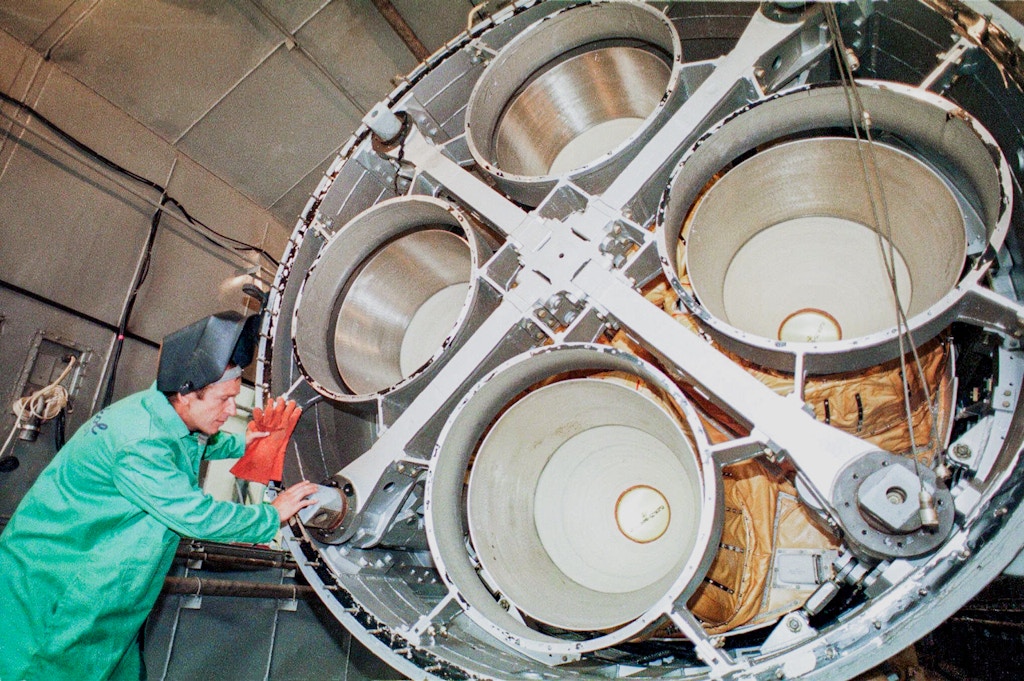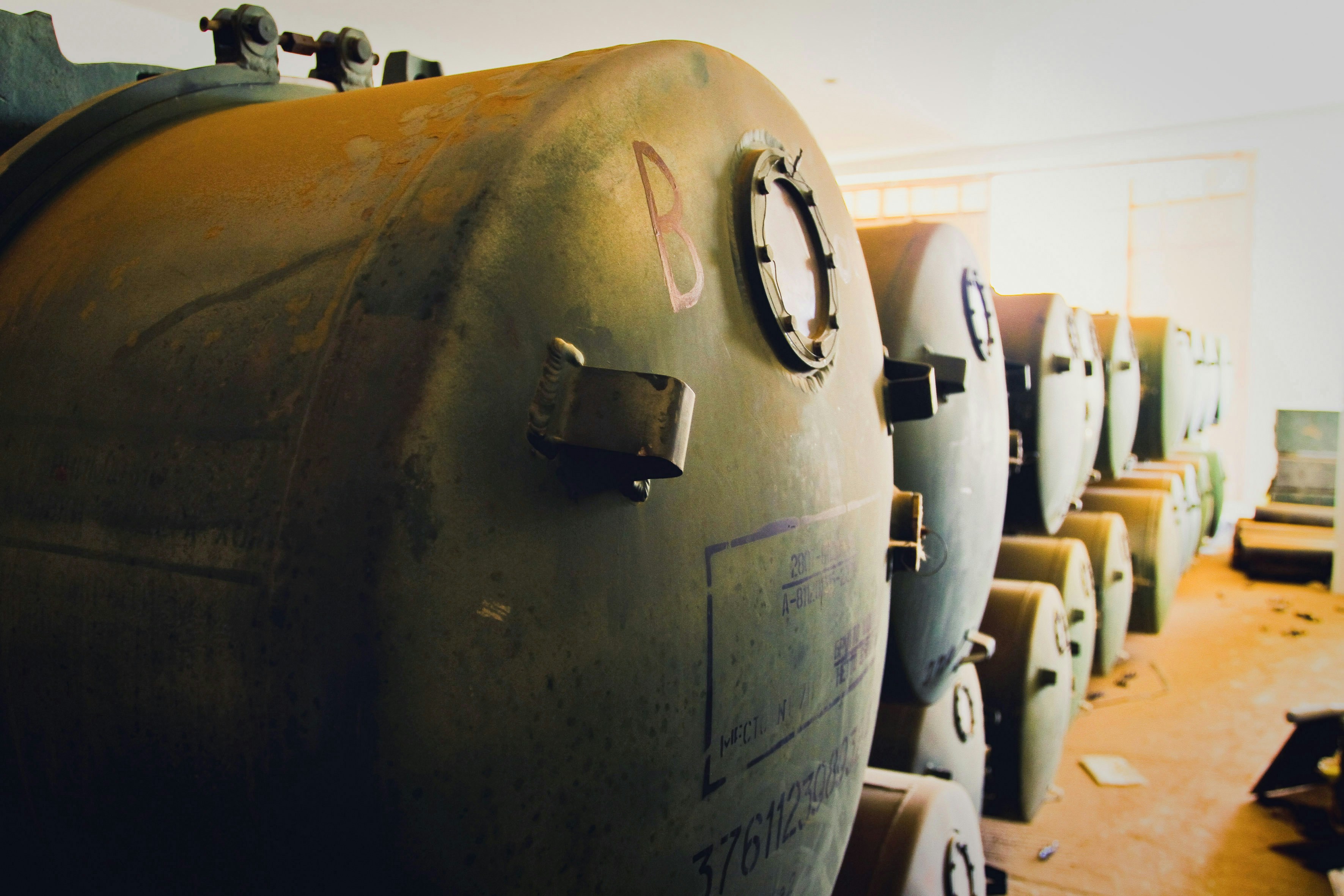
An engineer examines the engine of an SS-19 intercontinental ballistic missile in Dnipro, Ukraine, on July 26, 1996.
Photo: Efrem Lukatsky/AP
Ukraine was once home to thousands of nuclear weapons. The weapons were stationed there by the Soviet Union and inherited by Ukraine when, at the end of the Cold War, it became independent. It was the third-largest nuclear arsenal on Earth. During an optimistic moment in the early 1990s, Ukraine’s leadership made what today seems like a fateful decision: to disarm the country and abandon those terrifying weapons, in exchange for signed guarantees from the international community ensuring its future security.
The decision to disarm was portrayed at the time as a means of ensuring Ukraine’s security through agreements with the international community — which was exerting pressure over the issue — rather than through the more economically and politically costly path of maintaining its own nuclear program. Today, with Ukraine being swarmed by heavily armed invading Russian troops bristling with weaponry and little prospect of defense from its erstwhile friends abroad, that decision is looking like a bad one.
Nations that sacrifice their nuclear deterrents in exchange for promises of goodwill are often signing their own death warrants.
The tragedy now unfolding in Ukraine is underlining a broader principle clearly seen around the world: Nations that sacrifice their nuclear deterrents in exchange for promises of international goodwill are often signing their own death warrants. In a world bristling with weapons with the potential to end human civilization, nonproliferation itself is a morally worthwhile and even necessary goal. But the experience of countries that actually have disarmed is likely to lead more of them to conclude otherwise in future.
The betrayal of Ukrainians in particular cannot be understated. In 1994, the Ukrainian government signed a memorandum that brought its country into the global Nuclear Non-Proliferation Treaty while formally relinquishing its status as a nuclear state. The text of that agreement stated that in exchange for the step, the “Russian Federation, the United Kingdom of Great Britain and Northern Ireland and the United States of America reaffirm their obligation to refrain from the threat or use of force against the territorial integrity or political independence of Ukraine.”
Ukraine’s territorial integrity has not been much respected since. After the 2014 annexation of the Ukrainian territory of Crimea by Russia — which brought no serious international response — Ukrainian leaders had already begun to think twice about the virtues of the agreement they had signed just two decades earlier. Today they sound positively bitter about it.
“We gave away the capability for nothing,” Andriy Zahorodniuk, a former defense minister of Ukraine, said this month about his nation’s former nuclear weapons. “Now, every time somebody offers us to sign a strip of paper, the response is, ‘Thank you very much. We already had one of those some time ago.’”
Ukrainians are not the only ones who have come to regret signing away their nuclear weapons. In 2003, Libyan dictator Muammar Gaddafi made a surprise announcement that his nation would abandon its nuclear program and chemical weapons in exchange for normalization with the West.
“Libya stands as one of the few countries to have voluntarily abandoned its WMD programs,” wrote Judith Miller a few years later in an article about the decision headlined “Gadhafi’s Leap of Faith.” Miller, then just out of the New York Times, added that the White House had opted “to make Libya a true model for the region” by helping encourage other states with nuclear programs to follow Gaddafi’s example.
Libya kept moving forward. It signed on to an additional protocol of the International Atomic Energy Agency allowing for extensive international monitoring of nuclear reserves. In return, sanctions against the country were lifted and relations between Washington and Tripoli, severed during the Cold War, were reestablished. Gaddafi and his family spent a few years building ties with Western elites, and all seemed to be going well for the Libyan dictator.
Then came the 2011 Arab Spring uprisings. Gaddafi found that the same world leaders who had ostensibly become his economic partners and diplomatic allies were suddenly providing decisive military aid to his opposition — even cheering on his own death.
Promises, betrayals, aggression: It’s a pattern that extends even to countries that have merely considered foreclosing their avenues to a nuclear deterrent.

Missile silos abandoned by the Gaddafi regime are left in the desert at a military base in Lona, Libya, on Sept. 29, 2011.
Photo: John Cantlie/Getty Images
Take Iran: In 2015, the Islamic Republic signed a comprehensive nuclear deal with the U.S. that limited its possible breakout capacity toward building a nuclear weapon and provided extensive monitoring of its civilian nuclear program. Not long afterward, the agreement was violated by the Trump administration, despite the country’s own continued compliance. Since 2016, when Trump left the deal, Iran has been hit with crushing international sanctions that have devastated its economy and been subjected to a campaign of assassination targeting its senior military leadership.
To date, no nuclear-armed state has ever faced a full-scale invasion by a foreign power, regardless of its own actions.
The nuclear deal was characterized at the time as the first step toward a broader set of talks over regional disputes between Iranian and U.S. leaders, who had been alienated since the 1979 Islamic Revolution. Instead, the deal marked another bitter chapter in the long-troubled relationship between the two countries.
To date, no nuclear-armed state has ever faced a full-scale invasion by a foreign power, regardless of its own actions. North Korea has managed to keep its hermetic political system intact for decades despite tensions with the international community. North Korean officials have even cited the example of Libya in discussing their own weapons. In 2011, as bombs rained down on Gaddafi’s government, a North Korean foreign ministry official said, “The Libyan crisis is teaching the international community a grave lesson.” That official went on to refer to giving up weapons in signed agreements as “an invasion tactic to disarm the country.”
Perhaps the starkest contrast to the treatment of Ukraine, Libya, and Iran, however, is Pakistan, which developed nuclear weapons decades ago in defiance of the United States. Despite being criticized at the time for contributing to nuclear proliferation and facing periodic sanctions, Pakistan has managed to insulate itself from attack or even serious ostracism by the U.S. despite several flagrant provocations in the decades since. Today Pakistan even remains a security partner of the U.S., having received billions of dollars of military aid over the past several decades.
Given the mortal hazards that nuclear weapons pose to life on Earth, nonproliferation remains a worthwhile collective goal. Humanity will not benefit from a renewal of the nuclear arms race, and the ideals behind a U.S.-backed rules-based liberal order are morally attractive. A world in which they were truly applied would probably be a fairer and more peaceful one than what has existed in the past, yet we must also recognize that the liberal order can and will fail. That lesson is especially true for small nations outmatched by great powers.
Given the tragedy we are witnessing in Ukraine today — where, despite its past assurances, the international community has remained a passive observer — leaders of small countries must be forgiven for thinking twice before sacrificing their deterrent, regardless of what the leaders of great powers already armed with nuclear weaponry may say.
This content originally appeared on The Intercept and was authored by Murtaza Hussain.
Murtaza Hussain | Radio Free (2022-02-27T12:00:58+00:00) Lesson From Ukraine: Breaking Promises to Small Countries Means They’ll Never Give Up Nukes. Retrieved from https://www.radiofree.org/2022/02/27/lesson-from-ukraine-breaking-promises-to-small-countries-means-theyll-never-give-up-nukes/
Please log in to upload a file.
There are no updates yet.
Click the Upload button above to add an update.